

“A Community Led Environmental Endeavor – Call for Action” Presented by AID
Mr. Somnath Mukherjee – the Development Coordinator in “Association from India’s Development” (AID) USA has been invited to discuss the topic – “A Community Led Environmental Endeavor – Call for Action”.
At the beginning of his speech, he thanked Mukti for inviting him to this program. He interprets humans to the audience through his enlightening discussions and presentations. Just as not all people pollute nature, not all are devoted to nature. So, disaggregation is needed. We have to choose who we will follow.
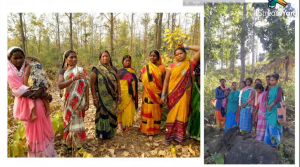
He has spoken of protecting the jungle and the indigenous people living in the jungle as he himself once has been contacted with them, especially in middle and East India. He referred to the tribal women of Lachmipur village in Koderma district of Jharkhand state. There is a class of people who are illegally destroying the forest in order to create stone quarries in this area. The livelihood of the indigenous people depends on this jungle. These women guard the forest by forming small groups after working all day to save their mother. These women resisted those who came to cut down the trees and snatched the cutting equipment, believing in the power of truth. The truth that prevails the whole universe – Everyone in the world has an equal right to survive. For generations, these women have been engaged in protecting the forest.
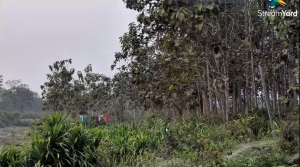
In his next presentation, he spoke of the coexistence of humans and wildlife. He spoke of a region of North Bengal where the river flowed between villages and forests. During the day, the people of the village bathe in the river, wash their clothes and dry them by the river and at night that river serves the wild animals. Wild animals come to the river to drink water. The people of the village are aware of every tree in the forest. This beautiful coexistence of nature and humans has set an example for all mankind.
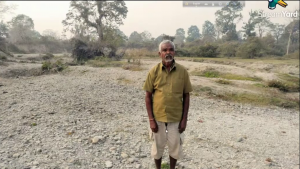
Mr. Mukherjee narrates the “story of Kanka – the organic intellectual”- a poor aboriginal farmer of North Bengal. Due to the scarcity of trees and food in the forest, the herd of elephants repeatedly invades his cultivated land and destroys the crops which he produces with great difficulty. Neither does he fill his own stomach nor the elephant. He becomes restless thinking the elephants are starving. He himself eats once a day but cannot bear the suffering of those helpless creatures. People like Kanka are organic intellectuals who can understand all the difficulties and desires of nature by being unitary with nature.
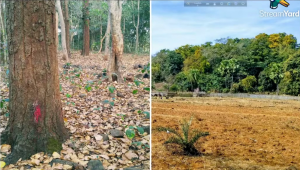
There are about 200 million indigenous people across India who are trying to save this jungle. In the Pakur district, the Santals build a village and a forest – the “Jaher Sthan” / “Sacred Grove” adjoining. They consider this place to be sacred and do no harm to it. If something is needed, then the whole village has to sit down democratically and determine it. There are some trees in this forest that even the indigenous people do not know their names. There is strange biodiversity in this forest that has been preserved by these Santal tribes for generations. These forests are deeply involved in their lives. They can die for this forest.
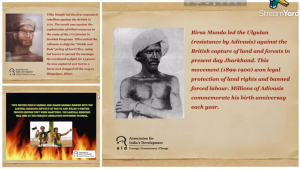
There were, are and will be many jungle-based civilizations in our country. Jungle-based civilizations are labeled as uncivilized by civilized people. The British again called them criminal tribes. The Zamindars and the British used the “Sabar”s as thieves. The history of tribes is not mentioned anywhere in the textbook. But they also revolted against the British to make India independent. If we want to save the earth and the jungle, we have to give these indigenous peoples protection, our concern and love.
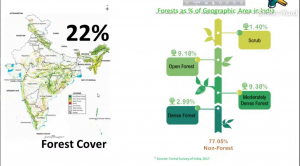
Before the British era, the common man used to save the forests for the sake of their livelihood. Neither the State nor any NGOs have taken initiative for the cause. The British annexed the forest governance to the Government as they have realized that forests are a rich source of timber and they can make money out of these forest recourses. In the past, the people of this tribal community used to decide about the forest, but now the state has started to decide. The state decided where the forest should be cut down, where the trees should be planted and so on. The people involved with the forest became illegal. India became independent after the expulsion of the British but the plight of those people did not subside. They are still identified as marginalized people. The Forest Department like the British also prohibits them from taking any initiative regarding forest issues. This is how history changed completely. Urban people blamed the indigenous peoples for deforestation.
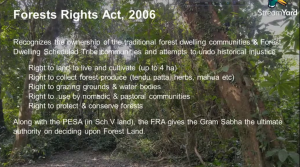
Only 3% of India’s current jungles are dense jungles. Arunachal Pradesh, parts of Central India, the Western Ghats and the Eastern Ghats have dense jungles because the indigenous people live there and protect the jungles.
After a lot of fighting, the “Forest Rights Act” has been introduced in 2006 where it has been acknowledged that indigenous peoples had been subjected to extreme persecution but this time they will be given their legal rights. The most notable law is CFR (community forest rights) through which the indigenous community was given the right to live in the forest, to use the resources of the forest for their livelihood and protect it. AID is working continuously for the rights of the aboriginals.
AID also has taken a community approach – protect the environment around your own living space. People will take responsibility for themselves and take care of their surroundings. AID is trying to revive the forest by making people aware of the flora. To protect the environment AID needs you all. AID hopes people will respond to its call and will help the organization protect the flora from destruction.
Project Activities
- A village for independent and enterprising women (A VIEW) (5)
- About Mukti (4)
- Accreditation (14)
- AGM (63)
- Agriculture Reforms (123)
- Ambulance Service (2)
- Amplifying Community Voices (67)
- Awards (15)
- Awareness and Empowerment (133)
- Awareness drives (57)
- Bio-Village-Kankandighi (10)
- Careers (14)
- Chick Rearing Programme for Marginalised Women (16)
- CHILD (18)
- Climate Resilience River Embankment (46)
- Covid-19 (74)
- Cultural Shows (7)
- Cyclone Aila (13)
- Cyclone Amphan (44)
- Cyclone Bulbul (30)
- Cyclone Dana (3)
- Cyclone Remal (12)
- Cyclone Response & Recovery (90)
- Cyclone Tolerant Houses (15)
- Cyclone Yaas (57)
- Disaster Recovery (264)
- Editorial (55)
- Editorial by Abir Biswas (1)
- Editorial by Amit Kumar Dey (2)
- Editorial by Ananya Chatterjee (3)
- Editorial by Ankita Kothiyal (3)
- Editorial by Debabrata Halder (1)
- Editorial by Dr. Alokananda Ghosh Sengupta (2)
- Editorial by Kasturi Bakshi (1)
- Editorial by Monami Mitra (1)
- Editorial by Nandita (3)
- Editorial by Pampa Karmakar (1)
- Editorial by Pranay Patra (1)
- Editorial by Prof. Pradeep Ray (1)
- Editorial by Ranitendranath Tagore (1)
- Editorial by Sankar Halder (14)
- Editorial by Satyajit Ray (7)
- Editorial by Sohini Mehta (1)
- Editorial by Sonamon Basu (3)
- Editorial by Soumitra Bose (2)
- Editorial by Subhankar Basu (1)
- Editorial by Supriyo Banerjee (3)
- Editorial by Ujjwal Maity (2)
- Education and Enrichment (409)
- Environment and Resilience (127)
- Featured Activities (24)
- Gram Clinic (9)
- Health Water & Sanitation (95)
- HOPE (10)
- Impact Stories List (109)
- Integrated Development (210)
- International Management Institute (IMI) (2)
- Jal hi Kal (6)
- Kitchen Gardening (16)
- Livelihood & Enablement (218)
- MCDF (119)
- Medical Camp (44)
- MIT (8)
- MKSS (49)
- MSS (142)
- Mukti Academia (5)
- Mukti Academy (2)
- Mukti Craft (17)
- Mukti Cultural (2)
- Mukti Employment Exchange (MEE) (9)
- Mukti Fresh (15)
- Mukti Gram - Egra (11)
- Mukti Gram - Purbashridharpur (170)
- Mukti Green Defense in Sundarbans (11)
- Mukti Yoga (12)
- Mukto Dhara (2)
- Northumbria University (2)
- Obituary (6)
- Observance Days Celebration (53)
- Organic Farming & Training Support (45)
- Pond Rejuvenation (20)
- Prerana (1)
- Prerna (4)
- Projects For Mukti Wide (7)
- Queen Mary University of London (1)
- Rights and Special Needs (113)
- Run for Cause (13)
- Run4SafeFood (7)
- SDF (6)
- Shahoshini (9)
- Skill & Enterprise Development (21)
- Smart lab (5)
- Social Stock Exchange (2)
- Social Workers' Convention (1)
- Sundarbans Green (SUN-G) (15)
- Sunderban development fair project (4)
- Surya (12)
- Sustainable Agriculture Movement (62)
- SWAS-2-0 (18)
- Swastha Shongini (32)
- Swavalamban Accelerator in Sundarbans (SWAS) (21)
- Tour for Cause (45)
- TSS (195)
- UDAAN (7)
- Uncategorized (99)
- University of Calcutta (1)
- Value Education (12)
- Valued Partners (3)
- Vocational Trainings (15)
- VOICE (14)